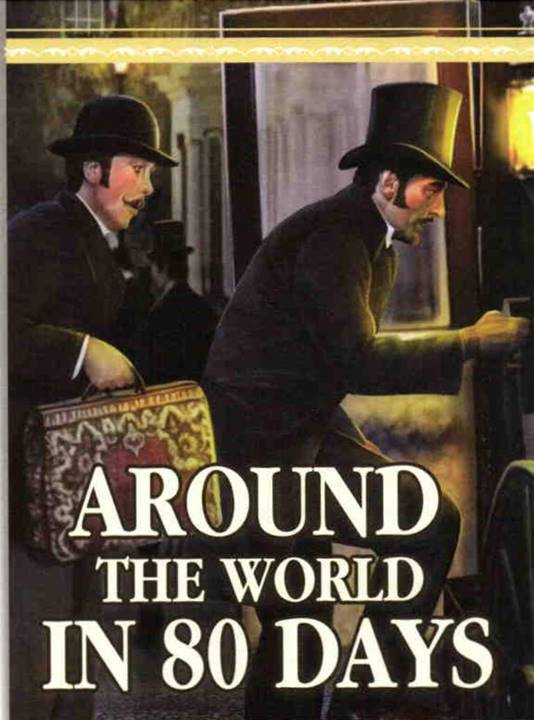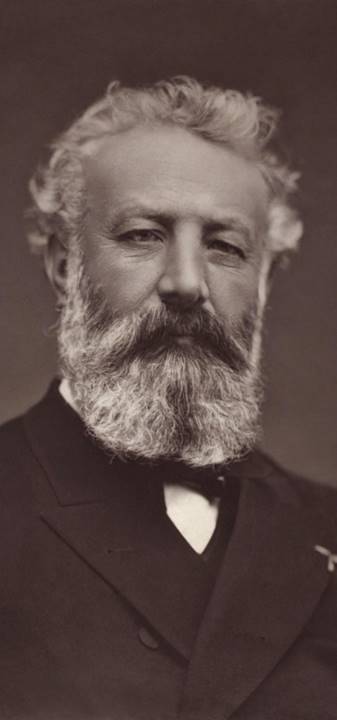
5d
SB. p. 88-89
21/01/2025
 Look
at the picture and the tittle of the text. Who are these characters? What are
they about to do?≈≈
Look
at the picture and the tittle of the text. Who are these characters? What are
they about to do?≈≈
Who is the author of ”Around the
World in Eighty Days”?
Read the information about Jules Verne:
 JV was born in Nantes, France. An author and pioneer of
science-fiction, Verne is famous for his adventure stories about space, air and
underwater travel. His works include Journey to the Centre of the Earth (1864),
From the Earth to the Moon (1865) and 20,000 Leagues under the Sea (1870). His
most famous novel, however, is Around the World in Eighty Days(1873) in which Phileas
Fogg accepts a bet worth £20,000 from friends. In order to win the
bet, he must travel around the world in only eighty days. The story tells of
his adventures with Passepartout, his valet, as they travel around the world.
JV was born in Nantes, France. An author and pioneer of
science-fiction, Verne is famous for his adventure stories about space, air and
underwater travel. His works include Journey to the Centre of the Earth (1864),
From the Earth to the Moon (1865) and 20,000 Leagues under the Sea (1870). His
most famous novel, however, is Around the World in Eighty Days(1873) in which Phileas
Fogg accepts a bet worth £20,000 from friends. In order to win the
bet, he must travel around the world in only eighty days. The story tells of
his adventures with Passepartout, his valet, as they travel around the world.
 What
do you think Phileas Fogg and Passepartout took with them on their trip?
What
do you think Phileas Fogg and Passepartout took with them on their trip? 
 Listen
to find out:
Listen
to find out:
https://rutube.ru/video/3bcd69ddc53589ca97d7a63 e89981c20/?t=89&r=plwd (min. 1.25)
1. Match the words to their meanings:
a. A type of bag made of fabric, often used for travel.
|
1. Valet 2. Mackintosh 3. Carpet bag 4. Guinea 5. Steam Transit 6. Sledge |
b. A coat or raincoat made from waterproof material. c. A servant who attends to the personal needs of his employer. d. A type of currency used in Britain, especially in the 19th century. e. A vehicle used for traveling over snow and ice, often pulled by dogs or horses. |
f. A form of transportation that uses steam power, such as trains or boats.
Open your books at page 88 and read the text.
2. Complete the sentences with the correct words from the text:
1. Mr. Fogg was preparing for a journey around the world in only
___________ days.
2. Passepartout was troubled and confused, asking, "What about the
___________?"
3. Mr. Fogg handed the woman twenty ___________ to help her and her child.
4. Passepartout packed clothes for both himself and his master in a
___________.
5. Mr. Fogg’s journey involved many different forms of transportation, including ___________ and ___________.
Think of a possible ending of the story.
Read the story to the end:
The next day, as soon as it was light, Possepartout rapped vigorously at his master's door. Mr Fogg opened it, and asked, “What's the matter,
Passepartout?” "What is it, sir? Why. I’ve just this instant found out..." "What?" "That we might have made the tour of the world in only seventy-eight days. ” "No doubt,” returned Mr Fogg, "by not crossing India. But if I had not crossed India, I should not have saved Aouda; she would not have been my wife, and...”. Mr Fogg quietly shut the door. Phileos Fogg had won his bet, and had mode his journey around the world in eighty days. To do this he had employed every means of transport - steamers, railways, carriages, yachts, trading-vessels, sledges, elephants. The eccentric gentleman had throughout displayed all his marvellous qualities of coolness and exactitude. But what then? What had he really gained by all this trouble? What had he brought back from this long and weary journey? Nothing, say you? Perhaps so; nothing but a charming woman, who strange as It may appear, made him the happiest of men! Truly, would you not for less than that make the tour around the world?
3. Decide whether the following statements are True or False:
1. Mr. Fogg’s goal was to travel around the world in 100 days.
2. Passepartout initially thought the idea of traveling around the world in 80 days was a joke.
3. Mr. Fogg planned to carry many heavy cases for the journey.
4. Mr. Fogg and Passepartout started their journey from London, heading to Paris.
5. Mr. Fogg was able to complete the journey faster by not traveling through India.
4. Answer the following questions:
1. Why was Passepartout so puzzled at the beginning of the story?
2. How does Mr. Fogg intend to travel around the world, and what is the time limit for his journey?
3. What is the significance of the twenty thousand pounds in the carpet bag?
4. How does Mr. Fogg show kindness to the poor woman at the train station?
5. What surprising realization does Passepartout have the next day, and how does Mr. Fogg respond to it?
6. In the end, what does Mr. Fogg gain from his journey around the world?
5. Discussion Questions. Answer in a paragraph or more:
1. What does the journey around the world represent for Phileas Fogg? Is it just about winning a bet, or is there something more to his motivation?
2. How does Passepartout's attitude change during the course of the story? Do you think he ultimately enjoys the adventure?
3. Phileas Fogg gains a wife and a sense of happiness after his journey. Do you think this was his goal all along, or was it an unexpected outcome?
 6.
Convert the following sentences into reported speech:
6.
Convert the following sentences into reported speech:
1.Mr. Fogg said, "We are off around the world in eighty days!” 2.Passepartout asked,
"What about the cases?" 3. Mr. Fogg told the poor woman, "Here you are,
my good woman.” 3.Passepartout asked, "What is it, sir? Why, I've
just this instant found
out…"
Answers:
1. Match the words to their meanings:
1.Valet - c. A servant who attends to the personal needs of his employer.
2.Mackintosh - b. A coat or raincoat made from waterproof material. 3.Carpet bag - a. A type of bag made of fabric, often used for travel.
4.Guinea - d. A type of currency used in Britain, especially in the 19th century.
5.Steam Transit - f. A form of transportation that uses steam power, such as trains or boats.
6.Sledge - e. A vehicle used for traveling over snow and ice, often pulled by dogs or horses.
2. Complete the sentences with the correct words from the text:
1.Mr. Fogg was preparing for a journey around the world in only eighty days.
2.Passepartout was troubled and confused, asking, "What about the cases?"
3.Mr. Fogg handed the woman twenty guineas to help her and her child.
4.Passepartout packed clothes for both himself and his master in a carpet bag.
5.Mr. Fogg’s journey involved many different forms of transportation, including steamers and railways.
3. Decide whether the following statements are true or false:
1.Mr. Fogg’s goal was to travel around the world in 100 days. False. He intended to do it in 80 days.
2.Passepartout initially thought the idea of traveling around the world in 80 days was a joke. True
3.Mr. Fogg planned to carry many heavy cases for the journey. False. Mr. Fogg only planned to carry a small carpet bag with minimal clothing.
4.Mr. Fogg and Passepartout started their journey from London, heading to Paris. True.
5.Mr. Fogg was able to complete the journey faster by not traveling through India. True.
Answers:
4. Answer the following questions:
1.Why was Passepartout so puzzled at the beginning of the story?
Passepartout was puzzled because he did not understand why Mr. Fogg was planning to leave for a journey around the world. It seemed like an unbelievable idea to him.
2.How does Mr. Fogg intend to travel around the world, and what is the time limit for his journey? Mr. Fogg plans to travel around the world using various modes of transport, including trains, steamers, and other vehicles. His time limit for completing the journey is 80 days.
3.What is the significance of the twenty thousand pounds in the carpet bag?
The twenty thousand pounds in the carpet bag is meant to ensure that Mr. Fogg and Passepartout will not encounter financial difficulties during their travels.
4.How does Mr. Fogg show kindness to the poor woman at the train station?
Mr. Fogg shows kindness by giving the poor woman twenty guineas to help her and her child. This act of generosity moves Passepartout.
5.What surprising realization does Passepartout have the next day, and how does Mr. Fogg respond to it?
Passepartout realizes that they could have completed the journey in 78 days instead of 80. Mr. Fogg responds calmly, explaining that if he hadn't traveled through India, he wouldn't have saved Aouda and married her.
6.In the end, what does Mr. Fogg gain from his journey around the world?
In the end, Mr. Fogg gains a charming wife, Aouda, and the happiness of having her in his life. This is the true reward of his journey.
Answers:
5. Answer in a paragraph or more:
1.What does the journey around the world represent for Phileas Fogg? Is it just about winning a bet, or is there something more to his motivation?
Phileas Fogg's journey represents much more than just winning a bet. While the bet is what initiates the adventure, the journey becomes a deeper quest for personal fulfillment, discovery, and even love. Through the experiences and challenges of his travels, Mr. Fogg learns the importance of relationships, especially when he meets and eventually marries Aouda. His motivation evolves from being about competition to about the meaningful connections he forms along the way.
2.How does Passepartout's attitude change during the course of the story? Do you think he ultimately enjoys the adventure?
Passepartout's attitude changes from confusion and reluctance to a sense of acceptance and even enthusiasm. Initially, he finds the idea of traveling around the world overwhelming and strange, but as the journey progresses, he becomes more engaged and involved in the adventure. By the end, despite the hardships, he is more supportive of Mr. Fogg and seems to have enjoyed the excitement and challenges of the journey.
3.Phileas Fogg gains a wife and a sense of happiness after his journey. Do you think this was his goal all along, or was it an unexpected outcome?
It was an unexpected outcome for Mr. Fogg. While he set out on the journey to win the bet, he had no intention of falling in love or marrying Aouda. His deep sense of duty and calm nature were initially focused solely on completing the journey. However, his interaction with Aouda, and the events that unfold along the way, lead to a transformative experience for Mr. Fogg, making love and happiness a surprising but meaningful result of his travels.
Answers:
6. Convert the following sentences into reported speech:
1.Mr. Fogg said, "We are off around the world in eighty days!" Mr. Fogg said that they were off around the world in eighty days. 2.Passepartout asked, "What about the cases?" Passepartout asked what about the cases.
3.Mr. Fogg told the poor woman, "Here you are, my good woman." Mr. Fogg told the poor woman that here she was, his good woman.
4.Passepartout asked, "What is it, sir? Why, I've just this instant found out…" Passepartout asked what it was and explained that he had just found out.
Материалы на данной страницы взяты из открытых источников либо размещены пользователем в соответствии с договором-офертой сайта. Вы можете сообщить о нарушении.